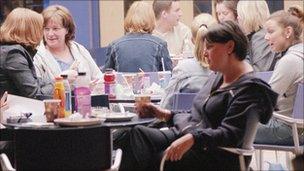Employability: the new student buzzword at universities
- Published

Students in England will pay higher fees from 2012
The Business Secretary, Vince Cable, bluntly told universities this week that the "biggest mistake" they could make in the new fees-based market would be to "under-estimate" their consumers.
Of course, Mr Cable's aim was to try to stop the rush of universities charging fees at the maximum level. But there are growing signs that prospective students are not just concerned about costs - they are just as interested in the return on their investment.
For many that will be measured in terms of improved career and salary prospects. This week the Office for National Statistics revealed that graduates earned £12,000 a year more than non-graduates over the past decade.
But that was an average figure, and job and salary prospects vary widely according to the university and the course chosen.
So, before paying up to £9,000 a year, many prospective students want to know what their particular university course will do for them.
Universities are getting the message. Nearly all now offer award schemes designed to boost, and formally recognise, "employability skills".
Self-discovery
And the pressure is about to get more intense. Proposals from the Higher Education Funding Council for England (Hefce) mean that, from autumn 2012, universities will have to provide course-by-course consumer data covering the job destinations and salaries of their recent graduates.
But is there a danger that a university education will become a utilitarian job-training scheme rather than an intellectual voyage of self-discovery? Is the fun and edginess being squeezed out of university life?
The new challenge to universities comes in the form of a mild sounding acronym: KIS, which stands for Key Information Set.
The proposal is that 16 sets of standardised information should be published on university websites, allowing easy course-by-course comparison. In effect it would be an official, Which?-style consumers' guide to universities.
The proposal is based on research by Hefce which found that prospective and current students rated employability-related benchmarks as particularly useful.
So, four of the 16 bits of information in the KIS will relate to job prospects, covering: the destinations of students six months after graduation, the proportion achieving a full-time "graduate" job, the average salary earned, and whether the courses are recognised by professional bodies.
Other information sets will cover quality and amount of teaching and facilities, study costs and bursaries, and assessment methods.
So is employability really such a key factor for prospective students when they are choosing where to study?
Recession
A report from the 1994 Group of universities found that 80% of students said future employability and salaries were a factor in deciding which university to apply to. This rose to 89% when students were deciding which particular course to take.
Until now, the signs have been that most graduates have indeed boosted their employability by gaining a degree. The 1994 group found that 80% of graduates were in graduate-level jobs within three and a half years of leaving university.
But that figure covers those who graduated before the recent recession. Current prospects may not be so good.

Some universities are offering students training in "soft skills"
With fees set to rise, and graduate vacancies still thin on the ground, universities believe they must focus more on boosting employability skills.
As Paul Marshall, executive director of the 1994 Group, told a conference last week: "We have to blend the student experience with developing the skills they will need for work".
That is why growing numbers of universities are now formalising what Marshall describes as "the co-curricular offer".
The University of Surrey is a pioneer at this. It runs a Global Graduate Award scheme, which provides free foreign language lessons to undergraduates, whatever their course, to boost their international employability.
And 80% of undergraduates at Surrey also take part in the university's Professional Training Year, which provides business and industry placements in the UK and abroad. Surrey also employs an "entrepreneur-in-residence", to encourage students to run their own businesses.
Employment machine
But is it a university's role to churn out oven-ready employees? Professor Christopher Snowdon, Surrey's vice-chancellor and chief executive, insists the university should not "flip over into becoming an employment machine" but says it does have a role "to develop the skills and education to meet tomorrow's challenges for a skilled workforce".
In a survey of graduate employment rates conducted by the Higher Education Statistics Agency last summer, Surrey came top with 96.9% of graduates in work or further study after six months of graduation.
But what do employers want? Would they rather students studied hard and gained a good degree or spent time on gaining employability skills such as team working, communication and problem solving?
Julie Mercer, head of education at Deloitte LLP, which recruits over 1,000 graduates a year, told a recent university conference that while it initially screens for candidates with at least 320 Ucas points and a 2:1, it then looks for graduates with "all those softer skills" of employability.
Donna Miller, European HR director for Enterprise Rent-a-Car, leans even further towards employability skills over academic qualifications.
She told the same conference that "fewer employers are now relying on the 2:1 as a cut-off" when choosing graduates, adding that focusing so strongly on academic grades was "rather archaic".
"Being well-rounded is what's really important. Someone who has only seen the inside of the library for three years is not going to be top of anyone's candidates' list".
So, it is a tough outlook for students - not only will they have to pay more to study, they will also have to spend more of their campus time developing employability skills and undertaking work placements if they want to get a return on their "investment".
Mike Baker is a freelance education journalist and broadcaster